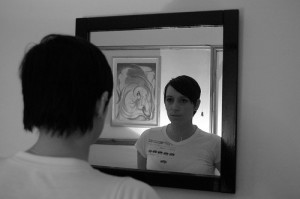
Health psychologist Kelly McGonigal, best known for her book The Willpower Instinct, says that when not otherwise engaged, the brain “defaults” to “finding fault with yourself, finding fault with others, imagining better alternative realities, thinking about the past.”
When I heard this, it was a real revelation to me that it wasn’t just me that tended to get mired in the negative, but that all of our minds have a “Screensaver of Doom.” It makes sense that our minds, which evolved for survival and not necessarily for happiness, would always be on the lookout for trouble.
Many people who struggle with their weight find that the Screensaver of Doom’s favorite subject is our bodies. When we look in the mirror, our eyes zoom in to the parts of ourselves we like the least — for me, Ground Zero is the belly area, followed closely by my thighs. It’s easy for me to ignore my shoulders or lower legs, which I like.
Don’t worry, I’m not going to tell you to stand in front of the mirror and look yourself in the eyes and say “I am beautiful.” There is some evidence that might just make you feel worse if you don’t believe it. I think it is better to try to find a way to look at yourself without zooming in on all the things you don’t like and picking yourself apart.
I have actually found that taking photos of myself (or recruiting my husband to take them) has helped me to see my body as a whole. I just make sure to be wearing flattering clothes when I have the photos taken. Take a lot of photos each time, changing angles and the way you are standing. Make sure the person taking the photos has the camera at or above your head height — photos taken from below make you look heavier. Notice that some photos look better than others. Then delete the bad pictures and keep the good ones. I have found that it takes 15-20 pictures to get 2-3 that I really like.
You might think that feeling better about your body will make you less motivated to lose weight. But think about it for a moment — what good has ever come of all of this negative self-talk?
Even if you resolve to lose weight after one of these sessions, you probably choose the most extreme and punishing methods possible, and then find yourself in an even more negative place when you can’t maintain your strict regime. What if, instead, you did feel good about yourself and your body? Wouldn’t you feel more motivated to take good care of something that you like, or at least accept, than something you despise?
Dr. Yoni Freedhoff, author of The Diet Fix, suggests two questions for dieters caught in shaming and blaming behaviors: “What can I do right now that I can be proud of? What can I do right now that will help a little bit?” These questions are designed to inspire healthy, positive actions instead of negative ones. Sustainable weight-loss behaviors are more about long-term self-care than a short-term boot camp.
Notice that the questions aren’t “What can I think right now?” No matter how hard you try, you will never completely get rid of negative thoughts, since the mind is built to generate them. You can’t control your thoughts, but you can learn to stop getting pushed around by them. Thinking about your weight or your body isn’t going to get you to a better place — action might.